Board games are a fantastic way to engage preschoolers in fun, interactive play while also fostering essential skills like counting, problem-solving, and social interaction. In this blog, we will explore the 10 best board games for preschoolers, provide guidance on how to choose the right board games, discuss the different types available, and highlight the benefits of introducing board games to young children.
Why We Should Provide Board Games for Preschoolers
Board games offer numerous benefits for preschoolers, including:
- Cognitive Development: Board games stimulate critical thinking and problem-solving skills. They encourage children to strategize and make decisions, helping to develop their cognitive abilities.
- Social Skills: Playing board games promotes social interaction. Children learn important skills like taking turns, sharing, and cooperating with others, which are crucial for their emotional and social development.
- Language Skills: Many board games incorporate language elements, helping children expand their vocabulary and improve communication skills. Games that require players to read or describe actions can enhance language development.
- Fine Motor Skills: Manipulating game pieces, drawing cards, and moving tokens help develop fine motor skills and hand-eye coordination. These skills are vital for tasks like writing and self-care.
- Emotional Growth: Board games teach children about winning and losing gracefully. They learn how to handle disappointment and celebrate others’ successes, contributing to their emotional intelligence.
How to Choose Board Games for Preschoolers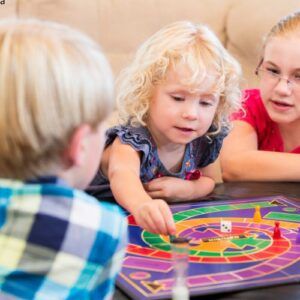
When selecting board games for preschoolers, consider the following factors:
- Age Appropriateness: Check the recommended age range on the box. Look for games specifically designed for preschoolers, as they will have simpler rules and themes that appeal to young children.
- Skill Development: Choose games that promote the skills you want to enhance. For example, if you want to focus on counting, select games that involve numbers or counting mechanics.
- Game Duration: Preschoolers have shorter attention spans, so opt for games that can be played in 20-30 minutes. This ensures they stay engaged without losing interest.
- Number of Players: Consider how many players the game accommodates. Multiplayer games encourage social interaction, while solo games can be a good option for quieter play.
- Simplicity of Rules: Look for games with straightforward instructions. Preschoolers benefit from games that are easy to understand and quick to set up.
Types of Board Games for Preschoolers
Board games for preschoolers can be categorized into several types:
- Counting and Math Games: Games that involve counting, adding, or recognizing numbers help build basic math skills.
- Memory Games: These games challenge children to remember the locations of cards or items, improving their memory and concentration.
- Strategy Games: Simple strategy games encourage critical thinking as children make decisions on their moves.
- Cooperative Games: In these games, players work together toward a common goal, promoting teamwork and collaboration.
- Role-Playing Games: Games that involve imaginative play allow children to explore different roles and scenarios, fostering creativity. (Some of the links within this post are affiliate links of which I receive a small compensation from sales of certain items, There is no additional cost to you.)
1. Candy Land
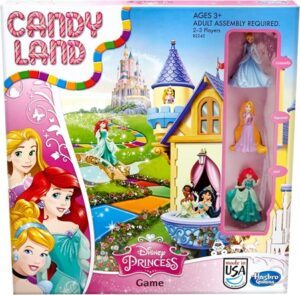
Overview:
Candy Land is a timeless classic that has entertained children for generations. This colorful board game takes players on a sweet adventure through Candy Land, navigating paths filled with vibrant illustrations and whimsical characters. The objective is simple: be the first to reach King Kandy’s castle.
Skills Developed:
Candy Land is excellent for teaching color recognition and basic counting skills. Children draw cards that dictate their movement along the board, making it a game of chance that helps them learn about taking turns and following directions.
Why It’s Great:
The bright, engaging artwork captures preschoolers’ attention, while the straightforward gameplay keeps them involved. Candy Land also promotes social skills, as children learn to celebrate each other’s successes and cope with setbacks.
Click to find the high-rated Candy Land board game:
Hasbro Gaming Candy Land Disney Princess Edition Board Game
Hasbro Gaming Candy Land Kingdom Of Sweet Adventures Board Game
2. Chutes and Ladders
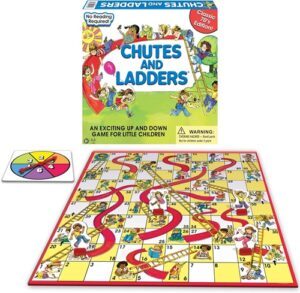
Overview:
Chutes and Ladders is another classic that has stood the test of time. Players navigate a board filled with ladders and chutes, moving closer to the finish line or sliding back based on the spaces they land on. The first player to reach the top wins!
Skills Developed:
This game is fantastic for teaching counting and number recognition. As players spin the spinner and move their pieces, they practice counting forward and understanding the concept of higher and lower numbers. The game’s ups and downs (literally) help teach children about consequences and the importance of perseverance.
Why It’s Great:
Chutes and Ladders is easy to learn and can accommodate multiple players, making it perfect for family game night. The excitement of climbing ladders and the disappointment of sliding down chutes keeps preschoolers engaged and eager to play.
Check the Classic Chutes And Ladders with 1970’s Artwork
3. Memory Match
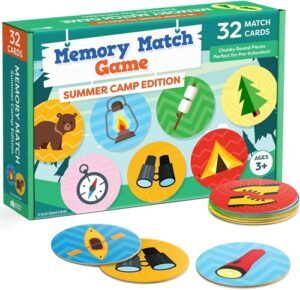
Overview:
Memory Match is a delightful card game that challenges players to find pairs of matching cards. The game consists of a set of cards that are laid face down, and players take turns flipping over two cards at a time to find matches.
Skills Developed:
This game is excellent for improving memory and concentration skills. As children play, they enhance their ability to recall locations and recognize patterns. Memory Match also encourages critical thinking as players strategize on which cards to flip based on their previous turns.
Why It’s Great:
Memory Match is adaptable, with various themes available, including animals, numbers, and shapes. Its simplicity allows for quick setup and play, making it an ideal choice for short attention spans.
You kiddo may be interested in Memory Matching Games for Kids Camping
4. The Sneaky, Snacky Squirrel Game
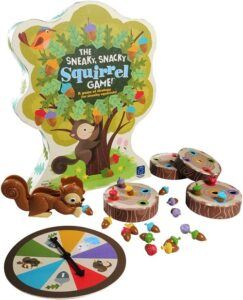
Overview:
In The Sneaky, Snacky Squirrel Game, players take on the role of squirrels collecting acorns. Using a cute squirrel-shaped tool, players take turns picking up acorns from the game board and placing them in their tree stump.
Skills Developed:
This game promotes fine motor skills as children use the squirrel tool to grasp and manipulate the acorns. It also teaches color recognition and counting as players collect acorns of different colors. The element of strategy involved in choosing which acorns to collect adds an exciting twist.
Why It’s Great:
The adorable theme and interactive gameplay capture preschoolers’ imaginations. The game encourages friendly competition and social interaction, making it a delightful addition to any playtime.
Get this fun The Sneaky, Snacky Squirrel Game
5. Animal Upon Animal
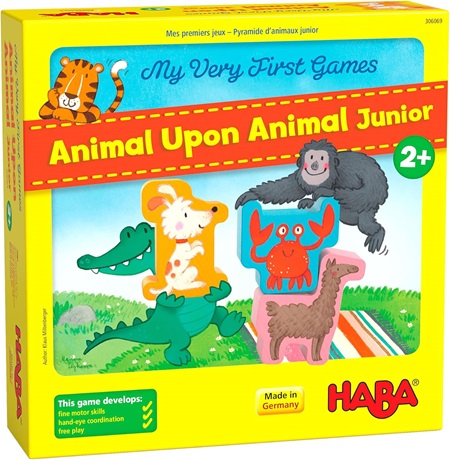
Overview:
Animal Upon Animal is a stacking game that challenges players to balance wooden animals on top of each other without toppling the tower. Players take turns rolling a die to determine which animal to stack, creating a fun and engaging challenge.
Skills Developed:
This game enhances hand-eye coordination and fine motor skills as children carefully balance their animals. It also introduces concepts of gravity and balance, encouraging critical thinking as players strategize how to stack their animals effectively.
Why It’s Great:
The colorful, chunky animal pieces are easy for little hands to grasp, and the gameplay is quick and straightforward. The laughter that ensues when the tower falls adds an element of fun that preschoolers love.
Click here to buy Animal Upon Animal Junior – Toddler Stacking Game
6. Zingo!
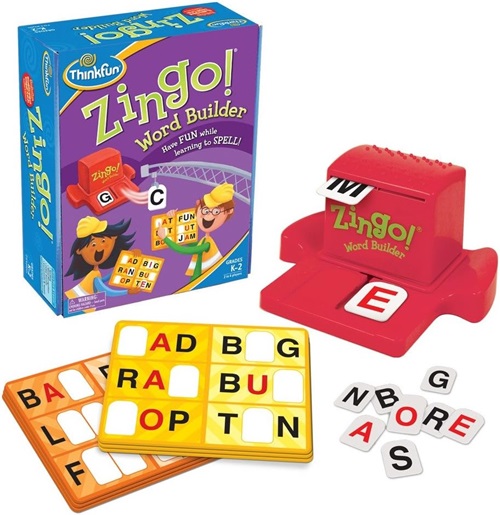
Overview:
Zingo! is a bingo-style game that helps young children learn vocabulary and word recognition. Players use a slider to reveal pictures and words, trying to match them to the spaces on their Zingo cards.
Skills Developed:
This game is excellent for language development, enhancing vocabulary, and improving visual recognition skills. As players search for matches, they practice quick thinking and decision-making while also learning to read simple words.
Why It’s Great:
Zingo! is fast-paced and highly engaging, keeping preschoolers excited as they race to fill their cards. The game can accommodate different skill levels, making it versatile for varying age groups and learning stages.
Check this Award-Winning Educational Toy: Zingo Word Builder
7. Hi Ho! Cherry-O
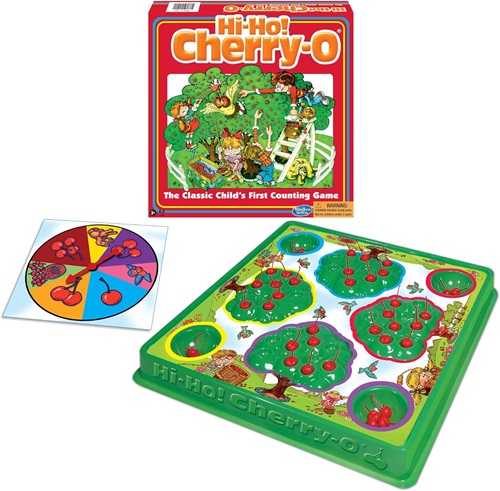
Overview:
Hi Ho! Cherry-O is a delightful game where players pick fruit from their trees and fill their baskets. The first player to collect all their fruit wins! The game includes a spinner that determines how many pieces of fruit to collect.
Skills Developed:
This game teaches counting and basic math skills, as players must keep track of their fruit collection. It also helps develop fine motor skills as children pick up the fruit pieces and place them in their baskets.
Why It’s Great:
The colorful components and simple gameplay make Hi Ho! Cherry-O a hit among preschoolers. The game encourages turn-taking and patience, as players wait for their turn to spin and collect fruit.
Check this The Classic Child’s First Counting Game: HI-Ho Cherry-O Games
8. Don’t Wake Daddy

Overview:
In Don’t Wake Daddy, players navigate a board to reach the finish line without waking the sleeping daddy. Players roll the dice and move their pieces, encountering various obstacles along the way.
Skills Developed:
This game enhances strategic thinking and decision-making as players choose their paths and deal with the consequences of waking Daddy. It also teaches counting as players move based on the dice rolled.
Why It’s Great:
The whimsical theme and suspenseful gameplay keep preschoolers engaged and entertained. The thrill of trying to sneak past Daddy adds an element of excitement that makes this game a favorite.
Don’t Wake Daddy Preschool Board Game
9. The Game of Life Junior
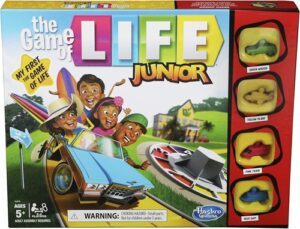
Overview:
The Game of Life Junior introduces preschoolers to the concepts of choices and consequences in a fun and simplified format. Players navigate through various life events, making decisions about careers, hobbies, and more.
Skills Developed:
This game teaches decision-making and basic financial literacy. As players choose paths and make choices, they learn about the impact of their decisions in a fun, low-stakes environment.
Why It’s Great:
The colorful board and engaging gameplay make it appealing to young children. The game encourages family discussions about choices and values, making it both entertaining and educational.
The Game of Life Junior Board Game for Kids Ages 5
10. Go Fish
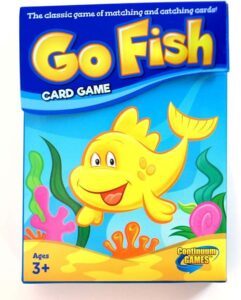
Overview:
Go Fish is a classic card game that is perfect for preschoolers. Players try to collect pairs of matching cards by asking other players if they have a specific card. If the player doesn’t have it, they say, “Go fish!”
Skills Developed:
This game enhances memory and social interaction as children learn to ask questions and respond to others. It also helps with number recognition as players keep track of their cards.
Why It’s Great:
Go Fish is simple to learn and can be played with various numbers of players, making it versatile for family gatherings. The game encourages interaction and laughter, making it a staple for playtime.
Conclusion
Board games offer a wonderful opportunity for preschoolers to learn while having fun. From enhancing cognitive skills to promoting social interaction, these games provide valuable experiences that support early development. Whether it’s the colorful world of Candy Land or the stacking challenges of Animal Upon Animal, each game on this list is sure to entertain and educate young children. So gather the family, roll the dice, and enjoy quality time together with these fantastic board games!
